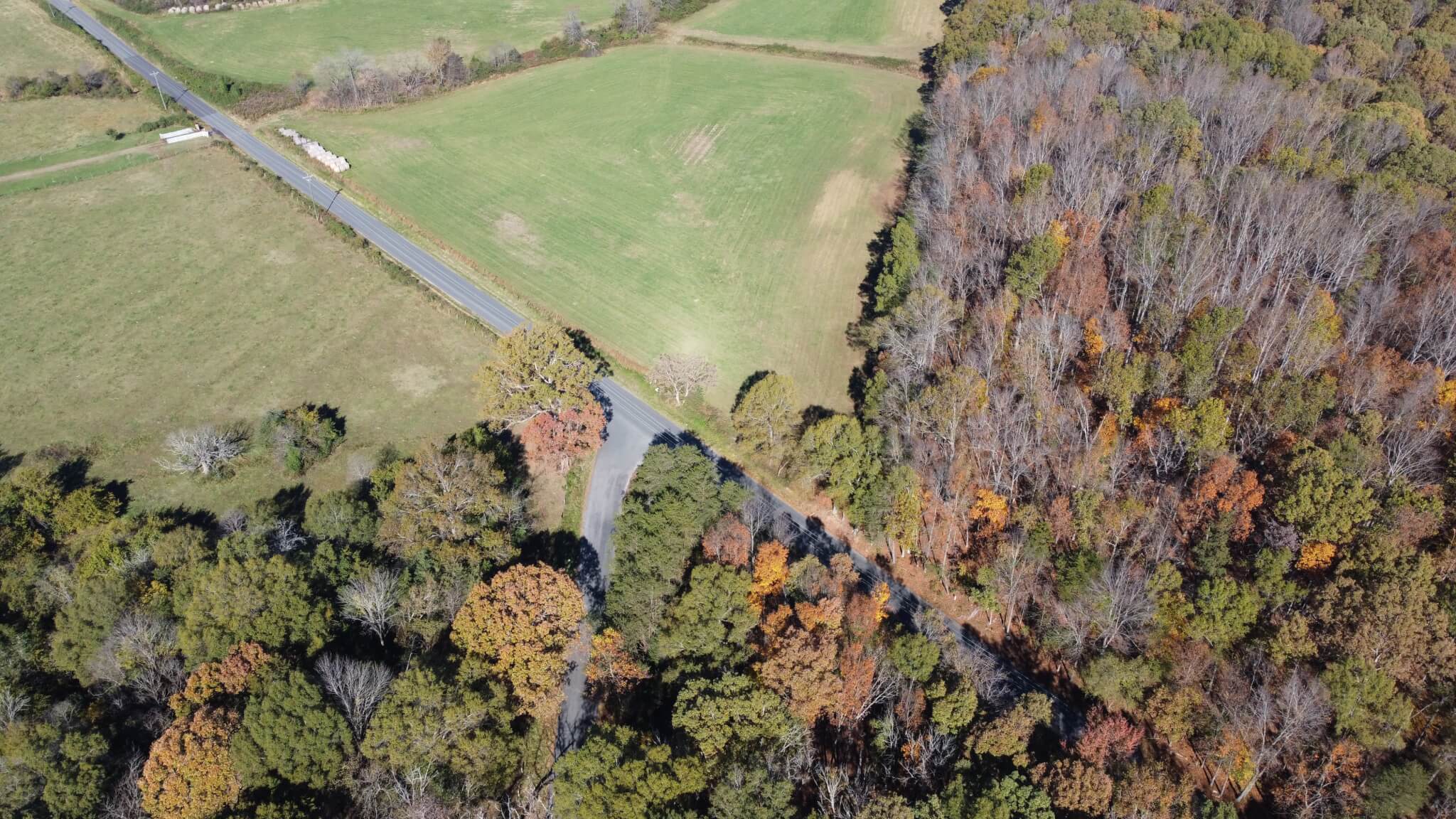
A flyover in rural Virginia shows a forest of trees bordering a cow farm and a hayfield. Taken around the beginning of November, when trees are multicolored and starting to drop their leaves. The two-lane road in the shot is the major road heading into the local town. The altitude of the drone was around 250 feet.
Going forward, we want to explore issues affecting Virginia’s rural regions. Some of the biggest issues include broadband access, economic development, and transportation.
Here at Dogwood, we’ve written about more metropolitan regions of the state, such as the Northern Virginia region and Richmond. But what about everything in between? The commonwealth isn’t just part of the “DMV” (District of Columbia, Maryland, Virginia) corridor, nor is it the Eastern Shore, which sometimes gets overlooked on maps. The commonwealth has so many unique bits to it that the rural areas often get overlooked.
What should we be covering when it comes to rural regions? We want to hear from you. You can email [email protected] or [email protected] and share your thoughts!
For now, we’ve put together this small primer on issues we know the rural population faces in the state, and we hope to eventually tackle more of these issues going forward.
Transportation
Getting from point A to point B can be very hard at times, especially when you live in a city like Richmond, where you aren’t allowed to make a left turn. We live in a society where there are more vehicles out on the roads than ever before, many of the state’s bus systems have gone fare free, and infrastructure is always a key point of discussion. As gas prices start to cause pain at the pumps, people have been looking at alternate means of transportation. It’s easier when you’re in a metropolitan area where you have options.
One of the booming parts of Virginia’s transit system is the Virginia Breeze bus line, which features routes that connect the rural areas from the furthest points in Southwest Virginia to more metropolitan areas like Blacksburg, Northern Virginia, and Washington, DC.
In rural areas, some people have to drive longer distances for essential services, if they even have a reliable vehicle. If they do not have a reliable vehicle, then people have to rely on ride-sharing services — which can get pricey depending on how far you go — or people have to figure out their local public transport system, which might not be as reliable as they hoped it would be.
Earlier this year, the Virginia Department of Health uploaded a Rural Health Plan to their website, examining the impacts of rural transportation systems on their respective communities. The Walsh Center for Rural Health Analysis noted in their Rural Evaluation Brief that the rural population in the commonwealth faces many challenges when it comes to transportation. One of the biggest challenges? A low population density combined with long travel distances creating an environment that can sustain and support the infrastructure for public transportation systems.
Many of the transit systems across the state also reported their findings. In the areas served by JAUNT, Inc., including the city of Charlottesville and the counties of Albemarle, Buckingham, Fluvanna, Greene, Louisa, and Nelson, people rely on JAUNT’s services to get to essential services like medical appointments, work, or even leisurely destinations in a timely fashion. It’s estimated that JAUNT’s fleet travels over two million miles each year.
Some rural communities don’t have the funds to keep up with infrastructure maintenance, leading to sub-par conditions for roads and bridges. In the commonwealth, there are 577 bridges that are considered “structurally deficient,” including Richmond’s Mayo Bridge.
Economic Development
Business is booming in the rural regions…in the agricultural sector. Virginia’s rural lands feature some picturesque farm views, but businesses aren’t just coming to the region for the beauty. Over the past few years, there’s been a boom in commercial hemp production, which has brought budding entrepreneurs and hemp processors to the region to set up shop. As Virginia works towards legal marijuana reform, it’s possible that hemp grown for agricultural and recreational purposes will help revitalize the economy in smaller regions.
Even as agricultural businesses find their footing in the state, the industrial sector, including manufacturing jobs, has been in decline. Even though Virginia was named as one of the best states for business in recent years, the “brain drain” phenomenon has led to people leaving their jobs in search of better opportunities in places that aren’t so rural, with better pay and better benefits. As people leave rural areas in search of better opportunities and jobs, the rural areas start to feel the impact, especially as skilled, talented workers exit jobs that have revitalized smaller regions.
Casinos are another hot topic in Virginia’s rural economic development. Bristol and Danville are two rural spots where casinos are slated to help boost the economy. Recently, the Hard Rock Hotel and Casino in Bristol was granted the first casino license in the commonwealth from the Virginia Lottery Board. The full casino is slated to open in 2024, while a smaller version is set to open in July.
Not only will casinos help bring in more jobs for the rural regions, but they’ll also bring in more revenue as people flock to them as a source of entertainment. On a similar note, skill games are still being contested in Virginia, leaving local governments confused on how to regulate the devices, even though they have helped generate $140 million in revenue. In 2020, a special tax was placed on skill games by the General Assembly, with funds going to a COVID relief fund, which helped businesses stay open during uncertain times.
Broadband
Over the course of the pandemic, broadband access became a pressing issue for citizens across the state. Roughly 8% of homes in Virginia aren’t connected to broadband, which makes getting connected with school, work, and the world much more difficult. Thanks to funds from the American Rescue Plan, as well as a commitment to having universal coverage by 2024, Virginia is on track to greatly improve its infrastructure. $722 million in funds announced by former Governor Ralph Northam will help 70 localities throughout the state get connected with broadband expansion. Closing the digital divide is a crucial issue in rural communities, where a goal is in sight.
Virginia Tech has a Center for Geospatial Information Technology, where research is going into figuring out how to improve tools for data collection and visualization. One of the tools that the Center is using is the Commonwealth Connection, which helps visualize where high-speed internet service is available, and will help state officials and consumers determine where the most reliable broadband points are, as well as where they’re lacking. It’s a positive step forward towards allowing localities access to data needed to get funds for broadband infrastructure, as well as a better way to reach places that aren’t as connected.

Here’s everything you need to know about this month’s Mercury retrograde
Does everything in your life feel a little more chaotic than usual? Or do you feel like misunderstandings are cropping up more frequently than they...

VIDEO: Check out Dogwood’s new merch line
Big news, Virginia! We've officially launched our Dogwood merch line 🎉 This year, we celebrate 5 years of bringing you Virginia news you can use....

VIDEO: Your support matters!
Your support matters! Donate today. @vadogwoodnews Your support matters! Visit our link in bio to donate today. #virginianews #virginia #community...

Op-Ed: Virginia’s new Democratic majorities pass key bills to improve your lives, but will Youngkin sign them?
The 2024 Virginia General Assembly regular session has wrapped up. It was a peculiar session from the outset, with Democratic majorities in the...

From the state rock to the state flower, here’s how Virginia got its symbols
Have you ever wondered why the Dogwood is the state flower? Or how the cardinal became the state bird? We’re here to answer those questions and more...

VIDEO: Second-gentleman Douglas Emhoff gives speech on reproductive freedom
Second gentleman, Douglas Emhoff touched on reproductive freedom not only being a woman's issue but "an everyone's issue" during the Biden-Harris...





